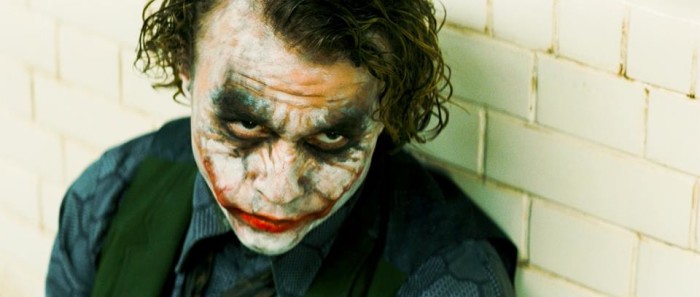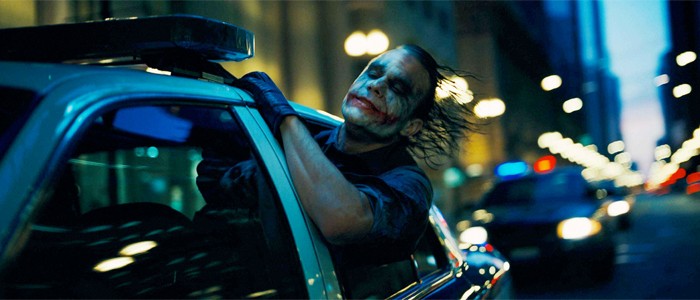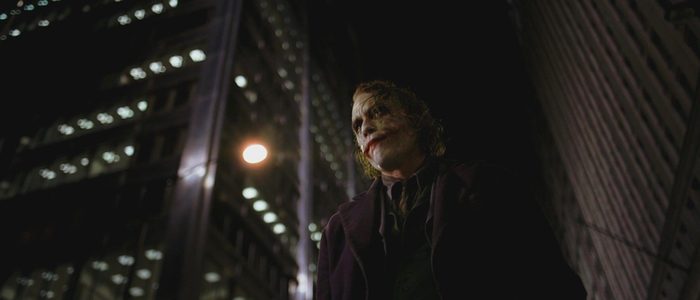‘The Dark Knight’ Gave Us the Greatest Movie Villain of the 21st Century

(Welcome to The Dark Knight Legacy, a series of articles that explore Christopher Nolan’s superhero masterpiece in celebration of its 10th anniversary.)
A decade ago, Christopher Nolan stepped into an echelon that only a few filmmakers occupy, wherein moviegoers around the world know his name as well as they know any movie star. Only a handful of directors — Steven Spielberg, Quentin Tarantino, Martin Scorsese — can claim entrée into this exclusive club. For Nolan, it’s thanks to his second superhero film, The Dark Knight, celebrating its tenth anniversary this week. There are many reasons why The Dark Knight remains an incredible, exciting, if still very disquieting blockbuster; perhaps the biggest reason of all is the conception, in writing, directing and performing, of Batman’s most feared villain, the Joker.

Put A Smile On That Face
By 2008, anyone with a passing awareness of popular culture knew who the Joker was. You didn’t have to be a comic book fan to know about the Joker as the gleefully insane, constantly opposing force to Gotham City’s Caped Crusader. The Joker had been brought to life on TV by Cesar Romero on the delightfully campy Batman TV series of the 1960s; on the big screen, he’d been realized by none other than one of the biggest movie stars in the world, Jack Nicholson. Nicholson’s performance as the Joker in Tim Burton’s 1989 Batman felt iconic, to the point where it was hard to imagine anyone else playing that character. It was such a big performance by such a mammoth performer that Nicholson was billed above Michael Keaton, playing the main character. Yes, part of that was because, simply, Nicholson was a bigger name; however, much of Batman feels like it’s designed to be about the Joker.
It may be hard to remember now, but when the late Heath Ledger was announced as the next Joker in the summer of 2006, people were…let’s say “displeased.” At this time, Ledger was fresh off his heavily interior, deliberately muted Oscar-nominated performance in Brokeback Mountain; prior to that, he’d been the lead of such non-hits as The Order, The Brothers Grimm and Casanova. It would not have been wrong to be, at least, a bit surprised at Ledger’s casting as the outsized Clown Prince of Crime. But as soon as Ledger’s interpretation of the Joker was shown on screen, it felt unique and unnerving in ways that earlier Jokers hadn’t.
Even now, a decade later, Ledger’s take on the Joker is singular in ways that even comic-book snobs couldn’t quite ignore. His Academy Award win for Best Supporting Actor was the first afforded to an actor in a comic-book or heavily genre-based film. (He wasn’t the first nominee—Alec Guinness in Star Wars, Al Pacino in Dick Tracy and Ian McKellen in the first Lord of the Rings got nominated in the same category. And Sigourney Weaver got a Best Actress nod for Aliens.) There were some cynics who presumed that Ledger’s win was entirely due to his tragic and unexpected death months before the release of The Dark Knight. Of course, we’ll never know, but so much about his performance seems as if it was destined to become iconography, whether or not Ledger lived to see that come true.

Why So Serious?
It’s worth remembering that the iconography began before Ledger died. In December of 2007, Warner Bros. released the opening scene of The Dark Knight as an extended preview in front of I Am Legend’s IMAX release. So we all got a chance to see Ledger in his shaggy clown makeup, and we all got a chance to hear the sing-songy voice he’d employ as the Joker. There was enough of a hint that this version of the character was not just a far cry from previous conceptions, but that he would feel truly remarkable.
With a decade in the rearview, Ledger’s take of the Joker only grows in importance. One element that is now impossible to ignore regarding how the character is written is how he seems preternaturally able to predict what other characters will do, seemingly gifted with psychic powers. Specifically, when Batman goes on a thrilling chase — first with the Bat Tumbler and then the Bat Pod — through the streets of Gotham to protect Harvey Dent as he gets transported via SWAT truck from one location to another, it seems like he’s able to stop the Joker in his tracks. As we learn, Batman has been working secretly with Jim Gordon, who’s driving the SWAT vehicle in disguise; the two of them are able to stop the Joker without killing him and without harming Dent.
Ah, if only it was that easy. No, the Joker apparently expected to be caught; after a memorably intense interrogation scene in which the Joker’s seemingly delirious mindset becomes clear — of all things, he appears to reference Jerry Maguire when he says that Batman “completes” him. Even though he’s in a dank interrogation room, the Joker reveals that he and his men have kidnapped both Dent and Batman’s old squeeze Rachel Dawes; they’re in different places, both of which will blow up in a short amount of time. Though the Joker gives Batman both locations, he pulls a secret switcheroo. When Batman arrives at the location where he presumes Rachel is located, he instead finds Dent. Dawes isn’t saved in enough time; the time it takes for Batman and Gordon to try and rescue Dent and Dawes allows the Joker to break out of prison, suggesting that he expected to go there to begin with.
The Joker’s innate ability to predict much of what will happen throughout The Dark Knight is a special power that’s been replicated in other recent blockbusters and their villains. There’s the best modern James Bond film, Skyfall, in which Bond comes up against a former 007 agent (Javier Bardem) whose fey personality belies a disturbing ability to know how the good guys will react, down to being captured by Bond specifically so he can enact a terrible plan in the middle of London to possibly kill Judi Dench’s M. And there’s the much less successful Star Trek Into Darkness, in which Kirk and Spock encounter a younger version of Khan Noonien Singh — in a timeline where they haven’t previously met Khan, so they don’t know what we know about the character — who is caught, during which time he can cause destruction amidst the Federation.
Continue Reading The Joker 10 Years Later >>
The post ‘The Dark Knight’ Gave Us the Greatest Movie Villain of the 21st Century appeared first on /Film.
from /Film https://ift.tt/2uHwMLP
No comments: